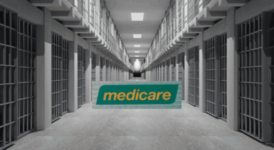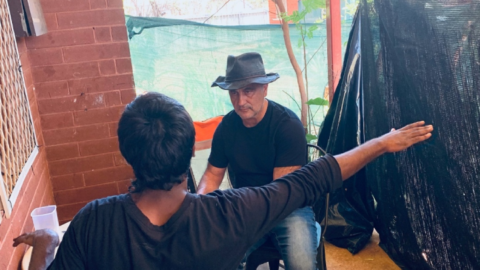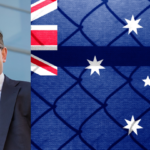Prisoners Must be Given Access to Medicare, Says Gerry Georgatos

Australia has a growing issue with incarcerating people, especially First Nations adults and children, and this habit of dealing with society’s most disadvantaged and marginalised people by hiding them in correctional institutions, extends to denying them regular healthcare inside.
Successive federal governments have denied prisoners access to Medicare since the public health scheme was rolled out. Yet, when many living at liberty in the community are confronted with this fact, they find it hard to believe the authorities would actually deny these people regular treatment.
Section 19 of the Health Care Insurance Act 1973 (Cth) stipulates that when health services are being provided by, on behalf of, or under arrangement with, any government entity – whether that’s federal, state or local – Medicare isn’t available to cover the costs.
This legislation considers that Medicare is denied to inmates, as the states are providing them with comparable treatment. However, the truth is, this nation’s correctional facilities don’t provide the same level of healthcare as outside, and inmates needing treatment are being denied it long-term.
Incarcerating the colonised
The latest ABS figures reveal that in September there were 40,907 adult prisoners in Australian gaols and 13,039 of these inmates were First Nations people, which means that despite their making up just over 3 percent of the population, Indigenous people account for 32 percent of adult prisoners.
First Nations people are known to have lower health outcomes compared with the non-Indigenous. That’s what Closing the Gap is all about. But the 2022 report relating to the 14-year-old scheme, found the goal of improving Indigenous life expectancy is not on track.
According to restorative justice advocate Gerry Georgatos, one in six First Nations people have spent time in Australian prisons, whilst one in 50 non-Indigenous citizens and residents have been incarcerated for a period.
The First Peoples of this continent remain a subjugated people. Their mass incarceration is a result of ongoing colonisation, as too are their poor health outcomes.
Indeed, if the government is serious about closing the gap, its excessive use of prison would be an ideal opportunity to improve these health disparities.
Minor reform: major outcomes
Georgatos, coordinator of the National Suicide Prevention and Trauma Recovery Project, is raising this issue, once again, as he considers the current Labor government could easily make the change, especially as this reform has been part of that party’s policy platform in the past.
As part of its work, the NSPTRP has been operating inside Western Australian prisons, where Georgatos, his daughter Connie, and colleague Megan Krakouer have witnessed the debilitating effects that delays in medical treatment have upon seriously ill inmates.
Sydney Criminal Lawyers spoke to prison abolitionist Gerry Georgatos about the government’s classist approach to prison healthcare, the fact that prison could easily be an opportunity to improve inmate health and how this could be reformed with the stroke of a pen.

People being held in Australian correctional centres are not being granted access to Medicare. This means inmates in the nation’s 115 adult prisons, as well as those at the 17 children’s prisons, don’t have readily available healthcare.
This is a long-term issue that many in this country find hard to believe. You’re again raising this point and calling for a change.
Gerry, your work takes you inside correctional centres at times. What sort of outcomes does the denial of Medicare bring for kids and adults in detention?
In the mad blasphemous squat that is a gaol cell, life’s brief light can be extinguished. Unnatural deaths in prisons occur at a dramatically higher rate when compared to wider communities.
In terms of rates, deaths in custody, particularly of young ages, is an abomination. These deaths are preventable deaths, but this language does not signify the health disparities and discriminations, which I argue are killing people.
Medicare in prisons would have most certainly kept many people alive who have suicided or died before their time from undiagnosed ailments or from poorly treated conditions and preventable complications.
Medicare in prisons can ensure onsite bulk billing physicians can diagnose or refer patients to specialists.
They can leave prison in better primary health than when incarcerated. They are validated, they matter. They are employable if in good health. They are less desperate.
It is my experience in general, that people come out of prisons in worse condition than when they commenced the situational trauma of incarceration.
With in-prison bulk billing physicians, mental health care plans and referrals can be crafted.
Recently, a coronial inquest damned custodial health discriminations and human rights abuses after the suicide of a young man – after nine suicide attempts where he was never seen by a doctor.
Be patient with things of this world, it is all too often said, as if to quell rebellion. The wait makes the affected old before their time.
I argue prisons are killing people and are holding pens of untreated ill-health: primary, secondary and mental.
We incarcerate like never before, demanding quiet in the darkness, as if it’s their fault, they live and breathe.
What would you say it means for governments around the country to be locking up about 40,000 adults and 1,000 children without the provision of easily accessible healthcare, including access to the Pharmaceutical Benefits Scheme?
It is my view and assessment that governments are clearly classist when it comes to the major crushing of the poor who comprise the incarcerated.
Governments maltreat children and adult prisoners as if lepers – similar to India’s once Untouchables.
They don’t care about them. If they did, they would not lock out healthcare. If they did, they would not prohibit Medicare to prisoners – to Australia’s most vulnerable children and adults.
Half a century has passed where Medicare – Medibank in its first iteration – has in fact not been universal throughout Australia, as prisoners are the reprehensible exception.
Health inequalities and discriminations in this nation’s 132 prisons are at their rifest. Nearly 45,000 prisoners are denied Medicare.
Therefore, Medicare is not universal as is touted. And before continuing further, I argue no legislative reforms are needed to pass both federal houses of parliament.
The solution is as simple as only requiring the federal health minister to issue an exemption to the exclusion of the gaoled from Medicare. Concomitant reform to legislation can then be pursued.
Medicare is denied to prisoners, old and young — to children as young as 10.
In addition, the incarcerated, in effect, are denied access to the Pharmaceutical Benefits Scheme and denied access to the National Disability Insurance Scheme, with disastrous impacts.
It is established and self-evident that nearly all of Australia’s prisoners are people living in the lowest quintile of income. Additionally, they also comprise the quintile of the weakest primary and secondary health.
The Australian Labor Party argues Medicare is universal and at times, has included in their national policy platforms, a promise to end the health discriminations of the incarcerated. They are yet to do so.
Despite making up just over 3 percent of the population, First Nations peoples account for about 32 percent of the adult prisoner population at present.
Can you talk about the implications of denying Indigenous peoples the right to accessible medical treatment in prison?
Prisoners have a higher prevalence rate of comorbidities than the general population, higher rates of disabilities, high rates of acute mental health conditions, and First Nations prisoners have even higher rates.
One in six First Nations people have experienced incarceration compared to one in 50 non-First Nations Australians.
Prisoners are nearly three times as likely to have acute mental health conditions compared to the rest of Australians and up to 15 times as likely to have a psychotic disorder. First Nations prisoners, once again, are hostage to higher rates.
With First Nations individuals making up around 30 percent of the national prisoner population, as well as having a higher susceptibility to health issues, healthcare catchups in prison are a missed opportunity.
Don’t get me wrong, I am a prison abolitionist, incarceration is cruel and barbarous and there are kinder and gentler ways but while prisons remain, they must ensure healthcare equalities.
We must get physicians, psychiatrists, psychologists, clinical counsellors, health educators, dental schemes and fully resourced infirmaries into prisons, so we leave all prisoners better off by the time they are no longer prisoners.
We need the services and personnel first: the rudimentary needs met, the daily needs met. Then we can employ First Nations and CALD personnel to assist with access to these services which for now do not exist.
Not only do you believe that Medicare should be rolled out to those inside, but as you’ve already mentioned, you consider that prison should be an opportunity for authorities to take a proactive approach to prisoner health.
What sort of medical system should be available for those currently being incarcerated?
The same level of healthcare as everyone else, as is outside prisons. I am reminded by Kahlil Gibran, of the body as the harp of the soul. Good health is all the poorest among us, in this viciously classist world, may have.
My daughter Connie Georgatos, who studies psychology and has worked in an adult prison for nine months in restorative works and with children post-release from juvenile detention, coordinates a Medicare in Prisons campaign.
Connie has stated, “We call for access to Medicare to the incarcerated. We argue the incarcerated would be validated, and this goes to the heart and soul of mental wellbeing.”
“They matter, as opposed to being made to feel they do not. We argue they also come in with a high rate of unaddressed ailments and poor health, and prisons should be in the least, transformational.”
“There should be an onus on ‘catchup’ health, addressing physical ailments, improving their overall health, and addressing psychosocial issues and their psychological wellbeing.”
“I believe such validations will cognitively widen individuals to shared understandings and values, and they will be less likely to reoffend.”
“I recount prisoners who complained for months and years of pain and because those who were meant to heed did not. They were not referred but given paracetamol. Their cancers spread.”
Medicare is a health funding stream to be accessed by every Australian, to ensure rapid access to vital services. What is available on the outside should be on the inside.
Not just equivalent healthcare but also every educational instrument, including tertiary.
Imagine a world where what life had denied you, prison gave you and you left prison with good health and a degree or trade qualification.
For a decade, the Australian Medical Association has advocated for prisoners to retain their Medicare rights.
The AMA states: “The loss of Medicare and of PBS entitlements while in prison, exacerbates the cycle of ill-health experienced by prisoners and detainees.”
Furthermore, the AMA insists the quality of healthcare has an indisputable impact on the rehabilitation of the individual. “Poor healthcare in prisons results in poorer physical and mental health long-term.”
In the past, Labor has suggested that prisoners should be extended the right to Medicare, however it hasn’t acted on this.
What sort of political will is there to make this change?
The federal government has an immutable opportunity to strive for its “leave no-one behind” claim.
There shouldn’t be another federal government leaving prisoners behind. But so far, it looks like the status quo of leaving them behind will remain unchanged.
More than half a million Australians — one in 50 — have been to prison. Poor health marginalises people into unemployment and underemployment.
The ALP says: “All Australians have a right to the best possible health.”
Connie Georgatos states, “There is no worse discrimination than health inequality. Many readers will find it hard to believe health rights, such as Medicare and the PBS, are denied to Australia’s 44,000 incarcerated adults and to nearly 1,000 incarcerated children.”
“There has been a long silence about this life-threatening inequality.”
More than half a million Australians have been to prison, 140,000 First Nations people have been to prison. Each year, nearly 5,000 children are incarcerated.
Our best bet is to educate the public. There are now multiple Medicare in prison campaigns, by academics, peak health bodies and by advocates with lived experience.
A former West Australian premier John Dowd is leading the newly formed Community Justice Coalition.
John wrote to me recently, “The issue of prisoner access to Medicare has been a live issue for some decades now.”
“Researchers, professional organisations and others have identified it as a significant problem, coroners have raised it in a number of inquests, and several representations have been made to governments to secure prisoners’ access to Medicare.”
“So far, these have been unsuccessful. We believe that now is a good time for a new concerted effort.”
“We have a new Labor government in Canberra, and prisoner access to Medicare is an official plank of Labor Party policy.
And lastly, Gerry, in your opinion, what’s the solution? And what needs to occur to bring this change about?
The Health Insurance Act 1973 (Cth) includes a clause to prevent “double-dipping” of medical services.
It assumed states and territories would fund equivalent access to health services and build internal health systems in prisons. They do not.
We need to understand this and be relentless in holding to account the lack of requisite infrastructure and resources.
When will we speak of this cruel unfairness and call for a love of one another?
I am reminded of Desmond Morris, zoologist and author of The Human Zoo, and his description of the harassed city-dwellers in teeming concrete jungles debilitated by induced abominations and reprehensions.
In fact, the grossest concrete jungles are the prisons, where, in my view, the affected are maltreated as once were lepers, held captive to demonisations and ceaseless cruel harassment. There is nothing redemptorist about prisons.
Some of our restorative works and transformational projects in adult and children’s prisons allowed us to witness the effects of health inequalities and the impacts of no Medicare.
Seemingly, there is an endlessness of horror stories of untreated infections that led to amputations, and worse, death.
With the cognitive criminal age of responsibility still at 10 years old, gaoled primary-school-aged children are denied Medicare.
I urge everyone to reflect on the trembling that is prison life and of undivided caring.
Let us not wage war on one another and move us from shadows to the light, rise beyond chains, bars and wires, prejudices, demonisation and turn our eyes to each other.
Let not the unfairness of the world harness us. Let not the good luck and bad luck we are born into divide us.
I urge the Departments of Justice and of Corrective Services — its people within — to interrupt their silences and prayers, to speak out and publicly contribute to collective consciousness universalisms and advocate on behalf of the hearts and souls they have been vested with their care.
Once again, I remind, the federal health minister has the power to immediately extend Medicare to prisoners.
Simple amendments to the relevant subsection of the Health Insurances Act, passed through parliament, can guarantee universality, but the federal minister has the power to include and give the go-ahead to Medicare for prisoners right now.







